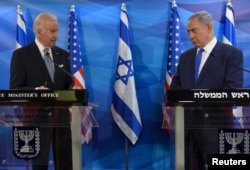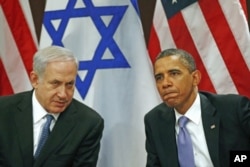The United States signaled Wednesday that it is moving toward a new package of military assistance to Israel, its closest Middle Eastern ally, even as relations between U.S. President Barack Obama and Israeli Prime Minister Benjamin Netanyahu remain fraught with tension.
U.S. Vice President Joe Biden, in Jerusalem for a meeting with Netanyahu, said the Jewish state's regional military superiority must be preserved with both the quantity and quality of its weaponry. The two countries are negotiating a new U.S. defense aid pact to replace the $3 billion-a-year agreement that expires in 2018.
The Israelis are seeking $4.5 billion annually from Washington; the U.S. is targeting a figure of about $3.7 billion. Netanyahu said in January that the two countries are finalizing details for a 10-year package.
Biden said the assistance is necessary because Israel is in a "very, very tough neighborhood, a tough and changing neighborhood. We are committed to making sure that Israel can defend itself against all serious threats, maintain its qualitative edge with a quantity sufficient to maintain that."
Biden told reporters that Obama has "done more to help bolster Israel's security than any other administration in history."
But whether a new aid package is completed before Obama leaves office next January is an open question. Israeli aides hinted last month that they may wait to complete a deal until his successor is sworn in.
Rocky relations
The relations between Obama and Netanyahu have been contentious. The latest dispute unfolded this week, when the White House said it found out through news accounts that the Israeli leader had decided not to make a trip to Washington next week for a meeting with Obama after first suggesting the get-together.
Nonetheless, David Makovsky, a senior fellow at the Washington Institute for Near East Policy, told VOA the U.S.-Israeli friendship has thrived despite the prickly Obama-Netanyahu relationship.
"Everyone has talked about the rockiness and the relationship between President Obama and the prime minister, while pointing out that the security relationship has survived and thrived, despite the political differences," Makovsky said. "But I don't know if in the eighth year of an eight-year year term there is great expectation of any grand turnaround at this point."
Even so, Makovsky concluded, "I think these are two countries that understand joint values and the U.S.-Israel relationship is really too big to fail. It's grown in breadth and depth, the security relationship is very vibrant, very strong. So it's a kind of [like] A Tale of Two Cities, you know: the best of times and the not exactly best of times."
Netanyahu's office said he called off next week's trip to Washington because he did not want to upstage the current Republican and Democratic presidential nominating elections, even though Obama is not on the ballot.
Leaders’ past spats
The United States has been a staunch ally of Israel for the duration of its nearly seven-decade existence in the turbulent Middle East, but there have been year-by-year conflicts between Obama and Netanyahu, both of whom assumed power in early 2009.
When the two leaders first met at the White House seven years ago, White House officials were irked that Netanyahu avoided endorsing Palestinian statehood, a U.S. priority that Obama now acknowledges will not become a reality before he leaves office.
Later the same year, Obama said in a Cairo speech that the United States "does not accept the legitimacy of continued Israeli settlements" in the West Bank — housing communities that Israel has expanded over the years even as the world community has denounced the new construction.
In March 2010, when Biden was on another trip to Israel, the Israeli government announced plans for a new 1,600-home settlement. Later the same month, when Netanyahu was in Washington, he was denied the normal formalities accorded a foreign dignitary, including the ritual handshake.
By 2011, a peeved Obama was caught on a live mic complaining about Netanyahu in a conversation with then-French President Nicolas Sarkozy.
"You may be sick of him, but me, I have to deal with him every day," Obama said.
Four years ago as Obama sought re-election, the White House viewed Netanyahu as a key supporter of Obama's Republican opponent, former Massachusetts Governor Mitt Romney, who was openly welcomed by Netanyahu on a visit to Israel.
There were new tensions last year as Obama and five other world leaders negotiated a nuclear agreement with Iran that curbed its development of nuclear weaponry in exchange for lifting sanctions that had sharply diminished Tehran's economy. Netanyahu, a staunch foe of the deal, accepted a Republican invitation to address Congress to denounce the deal as it was being negotiated. Obama refused to meet him while he was in Washington for the speech.
The two leaders subsequently met at the White House after the nuclear deal was completed, shook hands and moved on to discuss the two countries' mutual interests in curbing Middle East turmoil.
VOA's Elizabeth Cherneff contributed to this report.














